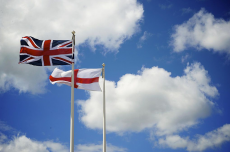
An arguable climax of this unseen mass patriotism was marked by the celebration of Victoria’s Diamond Jubilee, pictures of the processions show large numbers of people on the streets of London to view the Great Procession. This is evidence for the peak of new imperialism because the monarchy became increasingly associated with empire especially with the crowning of Victoria as Empress of India in 1877. It’s therefore obvious that imperialism at this time was a very popular policy to a large extent.
However the Boer War, 1899-1902, threatened public attitude towards Empire, particularly when the mass media informed people in Britain of the atrocious conditions in the concentration camps because expansionists like Rhodes propagated the British Empire as one that civilised the nations it conquered. The camps were a complete juxtaposition to what he had claimed revealing a weak link in the strength the Empire. At the very least the British Empire lost moral support due to the terrible organisation of these camps that caused the deaths of thousands.
The relief of Mafeking is another event that happened during the war. It has multiple interpretations of whether the public’s reaction (particularly the working class) to it was one of patriotism or merely a sigh of relief. On the one hand Marshall stated: ‘citizens…were to be seen parading the streets , shouting patriotic songs…dancing, jumping, screaming in a delirium of unrestrained joy’ This source suggests that the reaction was patriotic with the amount of hysteria conveyed in the lexis used and that they were celebrating the victory of their empire over the Boers. On the other hand there were a group of historians who came to be known as revisionists. Pelling described the working class reaction in May 1900 as an exception to the norm which arguably points to the celebrations being one of a release of tension and fears. This argument that the working classes weren’t consciously pro-imperialist is supported by the results of the ‘Khaki election’ which was held in September of that year. The conservatives polled only 400,000 more votes than the Liberal Democrats, which unlike the conservatives were divided for the support of the Boer War. Also jingoistic candidates from both parties were rejected from in many working class constituencies and it was found that Irish Home Rule was considered a more important reason than imperialism for voting Conservative in urban working class constituencies. The views revealed in the elections point to a more neutral view towards imperialism and that the working classes cared more about domestic policy than foreign policy. So perhaps the Mafficking wasn’t a show of mass patriotism at all.
A counter argument can be put forward concerning a popular form of entertainment called Music Hall. It was a mainly a working class audience that would go to the Music Halls and the songs had an emphasis on racial superiority, an aspect of new imperialism that the working class would welcome because it put aside social differences making them feel a sense of equality: “It’s the English-speaking race against the world”. A Music Hall song even coined the phrase ‘jingoism’ showing how there was a recurring theme of imperialism in many of their songs. It could be argued that with all these pro-imperialist songs and re-enactments that the working class would naturally be indoctrinated by the ideas conveyed and so must be supporters of the Empire to want to see this entertainment.
Image: By THOR (Summer Sky in Southsea England) [CC BY 2.0 (http://creativecommons.org/licenses/by/2.0)], via Wikimedia Commons

0 Comment:
Be the first one to comment on this article.